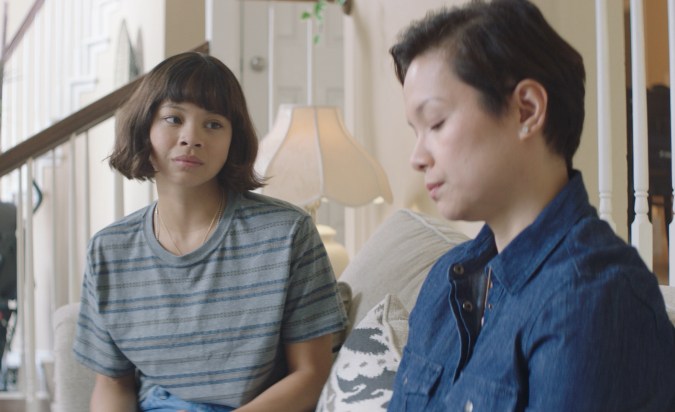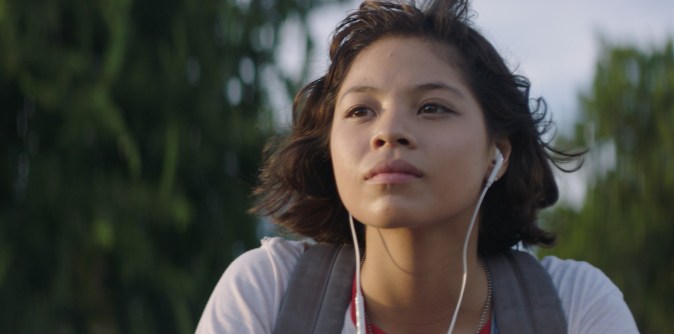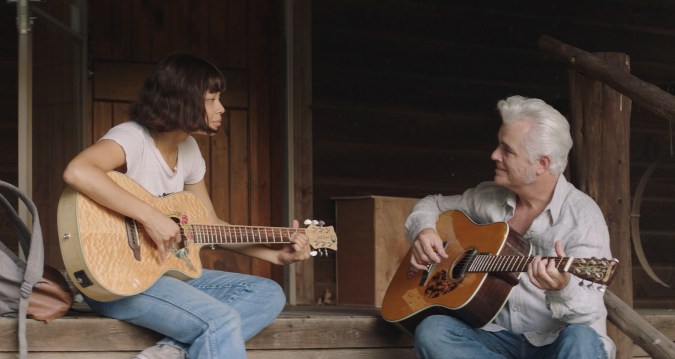Although she has yet to play a Latina character in her young career on stage or in front of the camera, Broadway star Eva Noblezada, who’s half Filipina and half Mexican, says she can’t wait for that opportunity to come her way—under the right circumstances.
In 2017, Noblezada portrayed a 17-year-old Vietnamese girl forced to work at a bar and brothel in the Broadway musical “Miss Saigon.” The role earned her a Tony Award nomination for Best Lead Actress. In 2019, she landed another Best Lead Actress Tony nod and won her first Grammy Award for Best Musical Theater Album thanks to her work in the Greek mythological-themed Broadway musical Hadestown.
In her first film, the musical drama Yellow Rose, Noblezada stars as Rose Garcia—a shy, 17-year-old undocumented Filipina and aspiring country-western singer living near Austin, Texas, who is forced to fend for herself when her mother is detained by immigration officials and processed for deportation.
Yellow Rose blooms bright and Noblezada is the reason.
As the title character, Noblezada is perfectly cast in the touching and timely role. The emotional journey Garcia takes while coming to terms with the separation from her mother is heartbreaking and authentic. Writer and director Diane Paragas does a great job of balancing themes of politics and music as audiences watch Rose try to build a singing career. Along with her incredible singing voice on songs like “Square Peg” and her duets with country singer Dale Watson, who has a supporting role in the movie, Noblezada makes a very compelling argument that the stage should no longer be the only platform she uses to share her talent with the world. Yellow Rose blooms bright and Noblezada is the reason.


During an interview with Remezcla this week, Noblezada talked about her biculturalism, how a film about immigration can change hearts and more. Yellow Rose opens in theaters on October 9.
This being your debut role in a film, was there anything that surprised you about how different the performance process is in a movie compared to the stage? Are you using the same muscles?
I would say I’m using the same muscles. I just try to make sure all my performances are authentic and as connected to the atmosphere of the piece as possible. So, whether that is theater and is big and dramatic or a film that is small and extravagant, it depends on the piece.
You play a Filipina teenager in the film, but in real life you’re a double threat – Filipina and Mexican. Do you identify with one side more than the other? How does your Mexican heritage play into your life and work?
I feel very much split down the middle. I’ve given myself the nickname ‘Mexicasian Persuasion.’ I’ve been very blessed to have a childhood enriched in both cultures equally with love and abundance. My grandparents literally lived down the street from each other. So, I would walk and have a Mexican breakfast with my Mexican family and then walk down the street and have a Filipino dinner with my Filipino family. I would say that I have yet to be part of a project that inspires me to dig a lot deeper into my Mexican side. So, I’m excited for that project to come up.
Now, we have to know what kind of Mexican breakfast your grandma would make you.
Oh, my nana makes machacado. It’s like last night’s dinner with eggs. She would be like, [impersonating her Mexican grandma] ‘Good morning, mija. Do you want some huevos?’ My nana also makes the best homemade tortillas, I can’t even tell you. I used to go to her house and eat like six of them with butter. Oh my God, they’re so good!
I’ve given myself the nickname ‘Mexicasian Persuasion.’
This is a story about a young Filipina, but it’s not only a Filipino story. Undocumented immigrants in the U.S. today are living in the shadows of their status and the fear that they can be deported at any moment. Can you talk a bit about the universality of Yellow Rose and why someone like your character makes such an impactful ambassador for that narrative?
I think we want to touch hearts and make sure people become aware and leave the theater feeling inspired to take action. But I also hope that any [person who sees] the film who may be living in a world with that kind of fear will feel like they are seen and know there are so many people rooting for them. We see the conditions that this current administration is allowing and how people and children are being treated in such inhumane ways. There are organizations and people who are doing the best they can to spread awareness about that. We’re hoping Yellow Rose can further that awareness about what’s going on with immigration issues. I hope people leave their political ideas at the door and see this story and say, ‘Wow, I never really sat down and thought about how horrible it must feel to be a young child living in a country that doesn’t want them because of the way they look.’

Do you think people might be more sympathetic to undocumented immigrants if they actually knew some?
Absolutely! Communities should be more inclusive, so you can meet more people and hear more stories. You are influenced by other people’s backgrounds and what they’ve been through. The basis of that is human kindness and basic empathy and sympathy. Maybe people would feel more inclined to do something for [undocumented immigrants] if they knew them. I hope the film makes people feel less hateful. I don’t understand why people feel hateful in the first place. Actually, I do. It’s called racism.
I hope the film makes people feel less hateful.
There is a scene at the beginning of the film where you’re looking at yourself in the mirror and try to widen your eyes with your fingers. Can you tell me a little about that scene and what it means to you in terms of assimilation?
Thankfully, I think we’re seeing a lot more inclusivity in society—from fashion campaigns to who we’re seeing running for elections. It’s very inspiring. In that scene, our director Diane Paragas had me hold up a picture of Dolly [Parton] or Loretta Lynn or Patsy [Cline]. She said, ‘I want you to imagine yourself in your room as a teenager.’ I used to do that. I would look at pictures in Vogue and then look at my face and wonder, ‘Hmm, what can I change? What can I alter to make myself look like this white model?’ I hope that’s a moment in the film that a lot of people can go, ‘There are also times when I don’t feel like I know who I am.’ It’s more a self-identity crisis. I remember doing that scene and feeling sad because it felt so familiar to me.
You have an aunt who was a regular character on Sesame Street in the 1990s. If given the chance, what Sesame Street character would you want to sing a duet with?
My aunt! I think her character’s name was Celina. She owned the dance studio. She would sing this song that went like [singing], ‘Let’s do the dance that starts with T!’ I think I would want to be a puppet character and sing with her. That would be so cool!

I read that as a little girl you used to sing the songs from the animated Disney film Mulan all around the house. Even though the remake this year was visually breathtaking, you had to be a little disappointed it wasn’t a musical, no?
I didn’t see the movie! I am a cheap-ass. I will not spend [$29.99] when I already have Disney+. Why would you make me pay more? And there’s no Mushu. There’s no Shang. I’m going to say a controversial opinion: I’m glad there was no music because a lot of these big films cast actresses who can’t sing. I said it. Everyone is thinking it. Why are you casting them in [musicals] if they can’t sing?
A film adaptation of Miss Saigon has been talked about for years. Would the lead role be something you’d like to play in a film version?
Absolutely not. I’ll be able to play a 17-year-old for a long time, but the role needs to go to a Vietnamese actor. The stage is different. There is a smaller window for casting. I got offered to audition for the role of Anita in [Steven Spielberg’s] West Side Story. It was a requirement to speak Spanish and I said no. They said, ‘Well, you can learn’ and I said, ‘You don’t understand. This is an authenticity thing. Hire a Latina actress who speaks Spanish fluently. It’s not a hard thing to do.’




